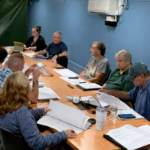The narrow passage of Article 2 by a 245-214 vote at the Nov. 13 Special Town Meeting to eliminate party caucuses and party affiliation on town election ballots signaled a shift away from what has become a divisive political culture over the past decade both locally and nationally.
The leaders of the Hopkinton Democratic Town Committee and the Hopkinton Republican Town Committee might not agree on political ideology. But in separate recent interviews with the Independent, they shared the common goal of a return to civility in political discourse. They also shared that while the lack of party caucuses could lead to more open seats on the ballot, parties and candidates will need to work harder to win voters’ approval and prevent write-in candidates.
Hopkinton was one of only 16 towns in Massachusetts that still used the party caucus system.
Party leaders extol caucus benefits
Amy Groves, the HDTC chair, led a campaign against Article 2’s passage. She presented flyers that detailed how caucuses allow more candidates to get on the ballot, which gives voters more choices. She noted that the Special Town Meeting debate focused more on people’s personalities than the party influence the article sought to curb.
She gave several reasons for this tension, including the current economy, debate over school expansion, and seeing arguments played out constantly on online platforms and television newscasts that influence societal behavior.
“I realize this is not a sexy answer and may not be what people may want to hear,” said Groves. “But I think we need to model better behavior in front of our neighbors. That is the only fix.”
Added Groves: “Trying to dismantle political parties is really going in the wrong direction.”
She noted that she knew of no democracies in the world where there were not at least two political parties. She called the party structure “the mechanism that keeps democracy in place.”
Groves said that the party structure means that “candidates don’t have to start from scratch,” because voters can get a sense of their ideologies through their party affiliations.
HRTC chair Jim Mirabile noted that many times people who are interested in public service can find it difficult obtaining the required 50 signatures by the deadline. Caucuses allowed people to explain their credentials to a wider audience and gain support. Independent or unenrolled candidates were able to be designated by either party’s town committee for the ballot.
“The bottom line is that what we had with the caucus process is we had some flexibility in appointing candidates,” he said. “I don’t think anyone can deny that we’ve lost that flexibility now.”
Added Mirabile: “It’s not just Republicans who are saying that it’s not worth it to put themselves out like that now.”
“Independent and unenrolled candidates lost their ability to caucus as well,” Groves agreed.
“Both parties have been working really hard year after year to try to fill the ballot,” Groves stressed. “Hopkinton has been very fortunate — much more fortunate than our [neighboring towns] — in finding full ballots every year and having contested races. Contested races aren’t fun for candidates and are very stressful, but they provide voters with a choice.”
The danger of not having full ballots, Groves said, is that a write-in candidate potentially could get elected with only a few votes and no prior public acknowledgment of their goals or backgrounds.
Mirabile had considered himself to be an independent until about two years ago, he explained. He decided to register as a Republican “when I started seeing how conservatives were being ostracized when it came to school activities.”
School Committee election likely catalyst
Asked about the catalyst to push for passage of Article 2, both Groves and Mirabile said May’s hotly contested School Committee race played a key role. Independent candidate Ashley Fogg was bested by Democrats Adam Munroe and Susan Stephenson after what Fogg referred to as “a smear campaign” against her online.
“I think a lot of this really had to do with the School Committee election,” said Mirabile. “But the truth is that this has been going on for years. People have gotten so intolerant of each other that the minority feels like it can’t express opinions without being shot down.”
Instead of political perspectives, the debates have focused on personalities, he continued.
“I actually reached out to Ashley to see if she wanted to come to our caucus,” Mirabile added. “But she didn’t, because she wanted to remain independent.”
Said Mirabile: “It was shameful how that all went down.”
“For some people, it seems to have come down to the School Committee race,” Groves agreed. “A lot of people left that race with differing ideas about what actually happened.”
Groves became HDTC chair after Darlene Hayes resigned. Hayes received a firestorm of criticism for posting negative comments under multiple aliases during the School Committee race under stories at both the Hopkinton Independent and HopNews websites. She also resigned from her positions on the Housing Authority and Cultural Council.
“My way of wanting to make public policy is to do what’s best for Hopkinton voters and Hopkinton residents,” Groves said, “and not about trying to get even and score points.”
Social media has been a huge factor in the divisive nature of politics on all levels of government, Mirabile and Groves agreed. Pandemic isolation encouraged people to interact with each other, often anonymously.
“Everything we try to teach our kids not to do with their classmates are things that we do — especially if candidates are registered as independent or unenrolled,” Mirabile stressed. “We have to address this as a community.”
In the case of using clickers to register votes at this month’s Special Town Meeting, Mirabile said that “anonymity can be a good thing” because people can be uncomfortable with standing votes.
Parties develop new strategies
Outreach through more traditional means will be key in engaging voters in the process, said Mirabile and Groves.
“Maybe it will be beneficial not to have caucuses because we will have to reach out to people more,” Mirabile said. “We’ll have to use mailers and just stay with our messaging. Our challenge is: Would our endorsement hurt or help?”
What also needs to change is to increase voter turnout, Groves and Mirabile added. Both Mirabile and Groves believe that there will be more open seats on ballots in the near future, which could lead to voters making uninformed choices.
“Party caucuses could come back when voters realize what they’ve lost by not seeing a party designation,” said Groves. “I’m also a little disturbed about the way that the article was written in that it also prohibits a nonpartisan municipal caucus.”
“We’ll end up with a lot of open seats on committees and boards now,” Mirabile said. “There are a lot of expenses in running campaigns for town positions.”
Networking, particularly through parents with children in the school system, can be an effective way to reach potential candidates, according to Groves. She has noticed that more candidates have come from Legacy Farms — a neighborhood with a high percentage of residents of South Asian descent — a trend she hopes will continue to increase diversity.
With the next town election on the horizon in May, moving toward more civil political discourse is key for both leaders.
“I think as a society, we’ve focused on what we disagree on,” Mirabile said. “We’ve lost sight of what we do agree on. It’s really distracting as a family, as a community and as a country.”
One place where Mirabile said he hoped he set a good example was at the recent Veterans Day dinner. He sat down next to Select Board chair Muriel Kramer, a Democrat and HDTC member.
“Muriel and I don’t agree on a lot of things politically,” he said. “But we had a wonderful time talking as neighbors and friends. That’s the way it should be. In the end, we all run into each other at the supermarket or sit in a nearby pew at church. We all care about the town.”






















Like most towns in our state, the reason for eliminating party labels is so that people CAN focus on the “personalities” of the candidates, instead of allowing them to hide behind party labels. Using party labels as a lazy excuse to not learn more about the personal qualities of the candidates in a big problem in this town. This problem reared its ugly head during the recent School Committee election, where a woman who has never lived in this town and has no children in our school system, mysteriously decides to move from PA to our little town in Hopkinton to run as a Democrat for the School Committee. What motivated her to do that? This is a very good question that maybe someday will get an accurate answer. In the meantime, we can thank HopNews for pointing out that this same person was twice convicted of drunk driving in PA while working as an educator. These are all facts, not “smears”. They are not “personal attacks” like Ms. Fogg endured. They are verifiable facts.
A fact, both of Fogg’s opponents in 22 & 23 have over a half century of educational experience regardless of what letter was next to their names on the ballot or length or residency. Neither of her opponents need a third-party present to meet with school leadership, have never made a scene at a youth sports event, aligned with an antimask our children group or was booted off the PTA board. Fogg skirted residents’ direct questions in public forums that include her viewpoints on book banning and youth LGBTQ+ parental concerns. Experience matters when focusing on a candidate and their platform is open to public scrutiny.